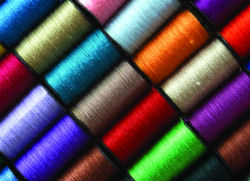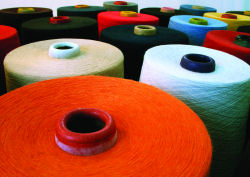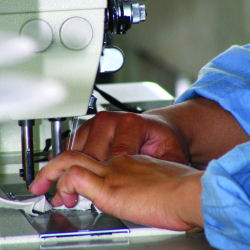A new study by researchers in the Department's Institute for Manufacturing's (IfM) Sustainable Manufacturing Group, sets out a vision of a sustainable clothes industry outlining how consumers could satisfy their needs for clothes and textiles with significantly reduced impact on the environment, and at the same time offer new opportunities to retailers and manufacturers.
The aim is to help answer the question of what we should do to create significant change at the sector level.
Dr Julian Allwood, Institute for Manufacturing



The report considers what could be done differently to make the industry more sustainable. Among other things, it recommends the use of more organic cotton, washing clothes at lower temperatures and encouraging consumers to buy fewer, high quality, longer-lasting clothes as well as more second-hand garments.
Some retailers have begun to address these issues but industry-wide change would require the evolution of new business models. Suggestions such as a focus on durability in the fashion world, and business models that would focus on extra services like repair and maintenance show that profit and growth can be achieved.
“The aim is to help answer the question of what we should do to create significant change at the sector level,” Dr Julian Allwood, from the Institute for Manufacturing, said. “We have focused on what might happen if we could make major structural changes to the way our clothes are made and used.
“For example, what would happen if we used different fibres or farming practices? What would be the consequence of washing our clothes in a different way, or keeping our carpets for longer?
“Businesses and the industry as a whole have to remain economically viable - or any change will have no benefit. The key to change is to ensure that government, industry and consumers work together to achieve a more sustainable clothes and textiles industry.”
Among other things the report lays out a model for the ideal consumer, who would drive environmentally-beneficial changes in the clothing industry by, for example, buying fewer clothes, washing them less and recycling them more. At the moment, consumers in the UK spend about £780 per head per year on textiles and clothes, purchasing about 2.15 million tonnes (35kg per person). Of this, just one eighth is sent for re-use through charities and the rest is discarded.
The report is intended to be valuable to a wide range of interested groups. It is written for people in business – who have to balance their personal ethics and the concerns of their consumers with the need for their business to prosper. It is written for consumers who have a limited budget but are concerned about the impact of their shopping choices. It is written for campaigners and those in education, government and the media – to try to provide as balanced evidence as possible about the present and future impacts of the clothing and textiles sector.
If you want to become a greener consumer today, then you can by following a simple practical set of recommendations:
- Buy second hand clothing and textiles where possible
- Buy fewer more durable garments and textile products
- When buying new products, choose those made with least energy and least toxic emissions, made by workers paid a credible living wage with reasonable employment rights and conditions
- Lease clothes that would otherwise not be worn to the end of their natural life
- Wash clothes less often, at lower temperatures and using eco-detergents, hang-dry them and avoid ironing where possible
- Extend the life of clothing and textile products through repair
- Dispose of used clothing and textiles through recycling businesses who would return them for second hand sale wherever possible, but otherwise extract and recycle the yarn or fibres.
To download or order a hard copy (free + postage & packing) of the 84 page report entitled: "Well dressed? The present and future sustainability of clothing and textiles in the United Kingdom" visit the IfM website.

